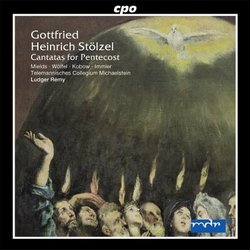| All Artists: Gottfried Heinrich Stolzel, Ludger Remy, Telemannisches Collegium Michaelstein, Dorothee Mields [or Blotsky-Mields], Jan Kobow Title: Gottfried Heinrich Stölzel: Cantatas for Pentecost Members Wishing: 0 Total Copies: 0 Label: Cpo Records Release Date: 6/15/2004 Genre: Classical Styles: Opera & Classical Vocal, Historical Periods, Baroque (c.1600-1750) Number of Discs: 1 SwapaCD Credits: 1 UPC: 761203987627 |
Search - Gottfried Heinrich Stolzel, Ludger Remy, Telemannisches Collegium Michaelstein :: Gottfried Heinrich Stölzel: Cantatas for Pentecost
 | Gottfried Heinrich Stolzel, Ludger Remy, Telemannisches Collegium Michaelstein Gottfried Heinrich Stölzel: Cantatas for Pentecost Genre: Classical |
Larger Image |
CD Details |
CD ReviewsIf There Had Been No JS Bach.... Giordano Bruno | Wherever I am, I am. | 09/16/2009 (5 out of 5 stars) "... perhaps Gottfried Heinrich Stölzel (1690-1749) would be as much a household name and a revered composer of 'sacred' music as Bach is today. The six cantatas recorded here, chosen from the several annual cycles that Stölzel in almost the same years when Bach wrote his, resound with the same contapuntal energy and harmonic expressivity as Bach's. I'm reasonably sure that most listeners, even musically trained aficionados, might mistake a Stölzel cantata for a Bach on first hearing, Not to detract in any way from Bach's magnificence, it has to be recognized that what many people consider the essence of Bach's music was in fact the shared common musical vocabulary of Bach's milieu. Was every one of Bach's cantatas an unmatched masterwork? You might answer that question differently after you've heard this accomplished performance of works by the forgotten part-time Court Composer of - are you ready with a map? - Sondershausen.
Stölzel's primary professional berth was in the Duchy of Gotha-Altenburg. Gotha is a small city about halfway between Erfurt and Eisenach, the heart of Bach-und-Luther Land. The small repertoire of his music that was carefully preserved in Sondershausen achives, however, represents almost all that has survived; the much larger body of music written for and in Gotha was irresponsibly neglected and perhaps intentionally destroyed. Sic transit gloria musicorum. Five of the six cantatas on this CD were intended for performance at Pentacost, the Sunday devoted to the Holy Spirit. They are richly expressive of both inspiration and consolation, that gift of the 'tongues of fire' and of the promise of constant divine attention to mortal cares. Several of the chorale and aria texts will be familiar to fans of the cantatas of Telemann as well as Bach. Stölzel is closer to Bach in his employment of highly 'athletic' instrumental obbligatos decorating his arias. It's common for both composers to write a four-layered texture of a vocal melody, over an arpeggiated obbligato on flute or bassoon, over a long-note countermelody, over the figured chords of a basso continuo. Conductor/musicologist Ludger Rémy has long been one of the foremost exponents of German Baroque music, with numerous brilliant recordings of the Bachs, father and sons, of Telemann, and of less-renowned masters like Stölzel. His ensemble, the Telemannisches Collegium Michaelstein is unabashedly committed to "historically informed" performance on Baroque period instruments; their proficiency needs no excuses. The soloists on this CD, led by soprano Dorothee Mields, are all four gifted with lovely voices and exquisite technique." |
